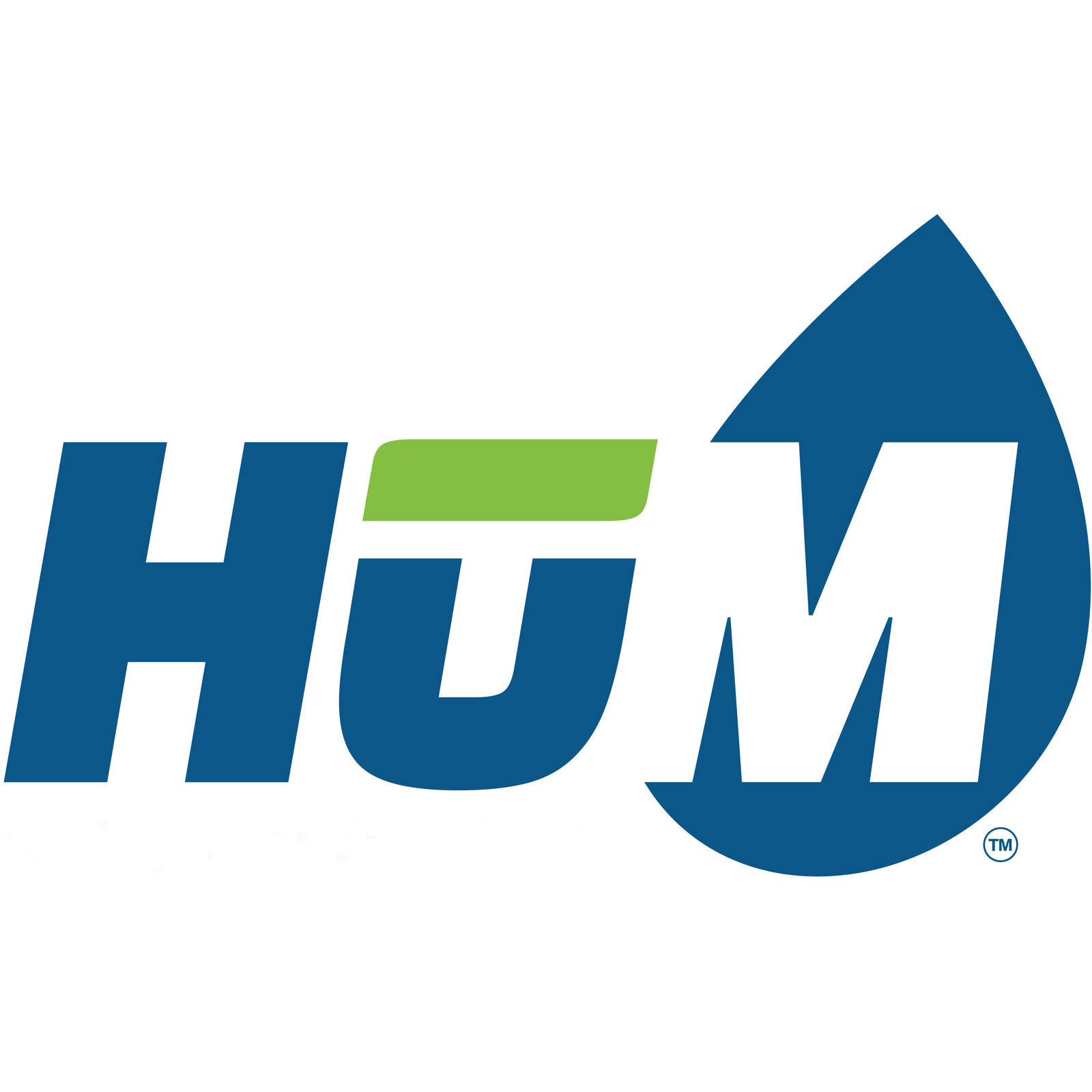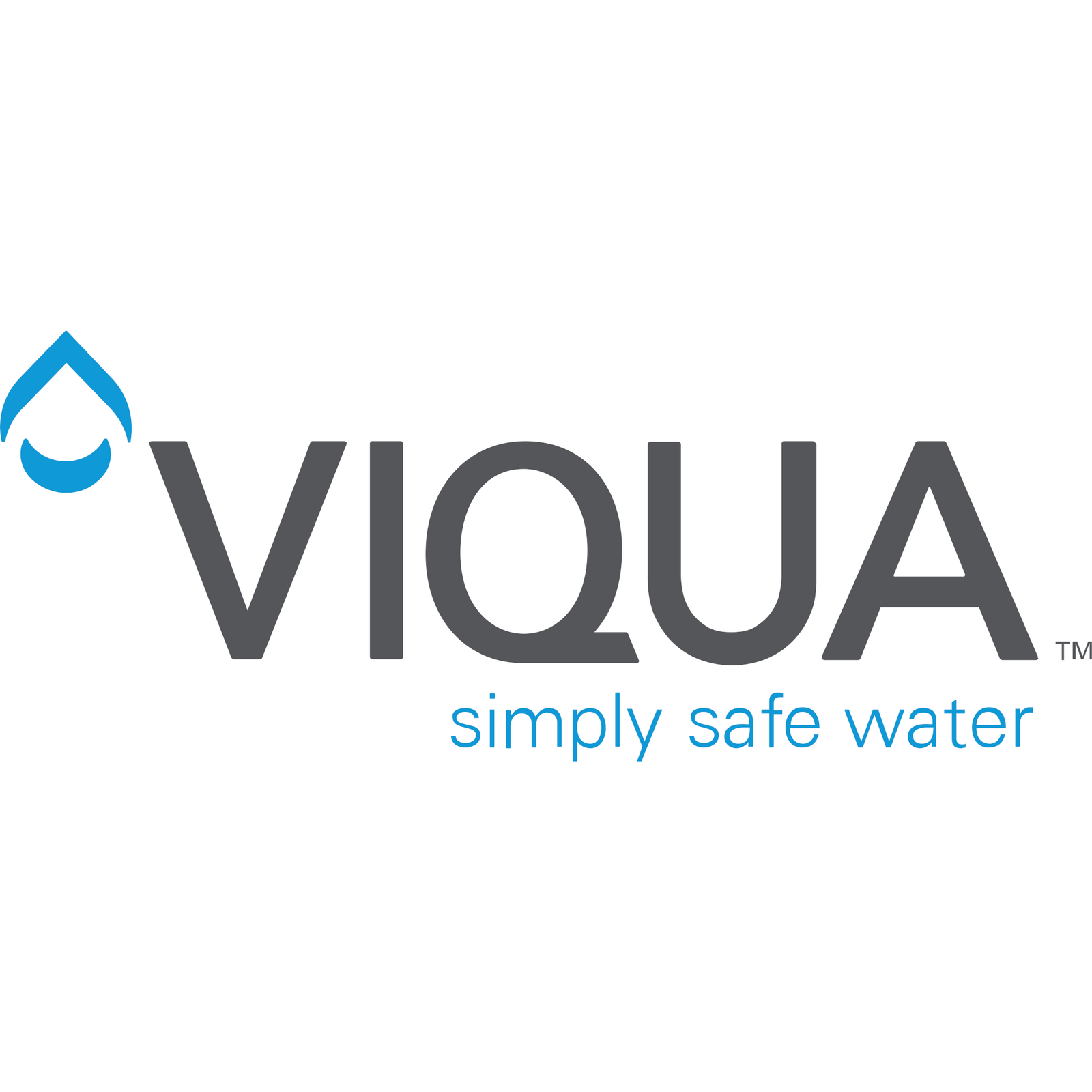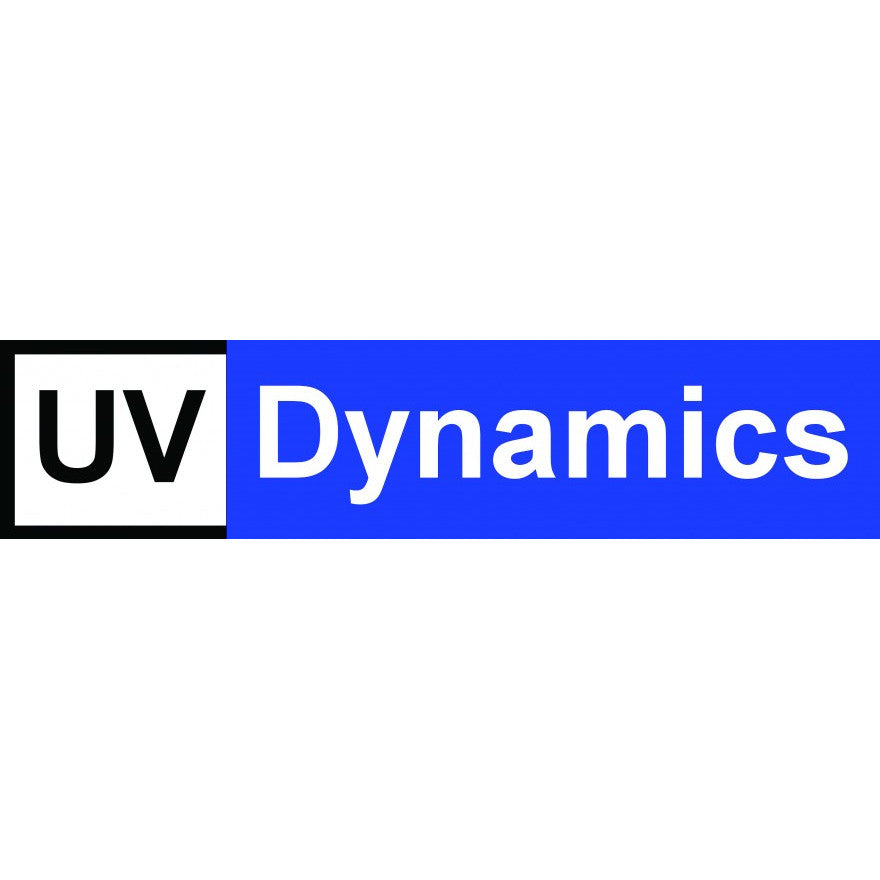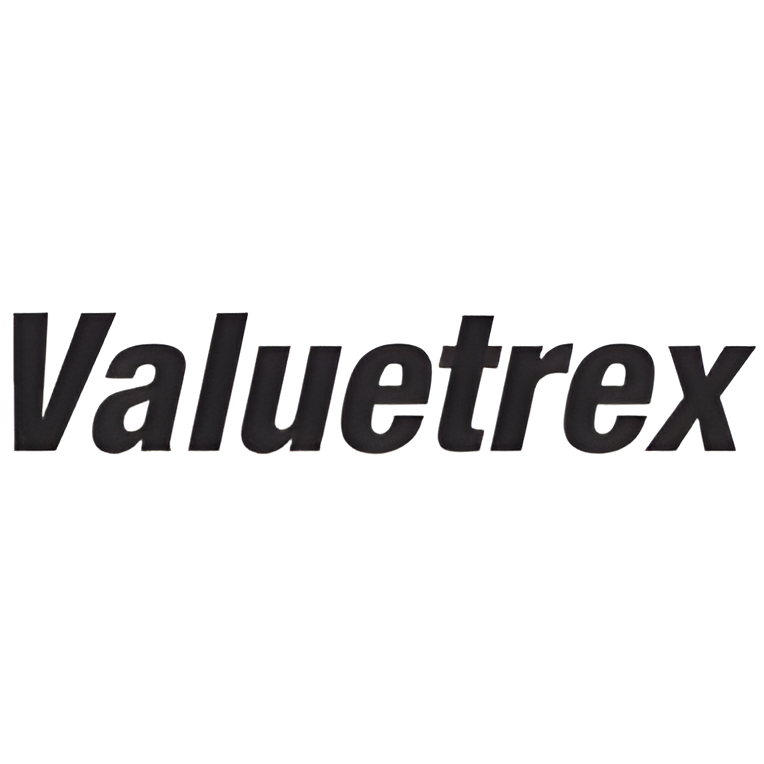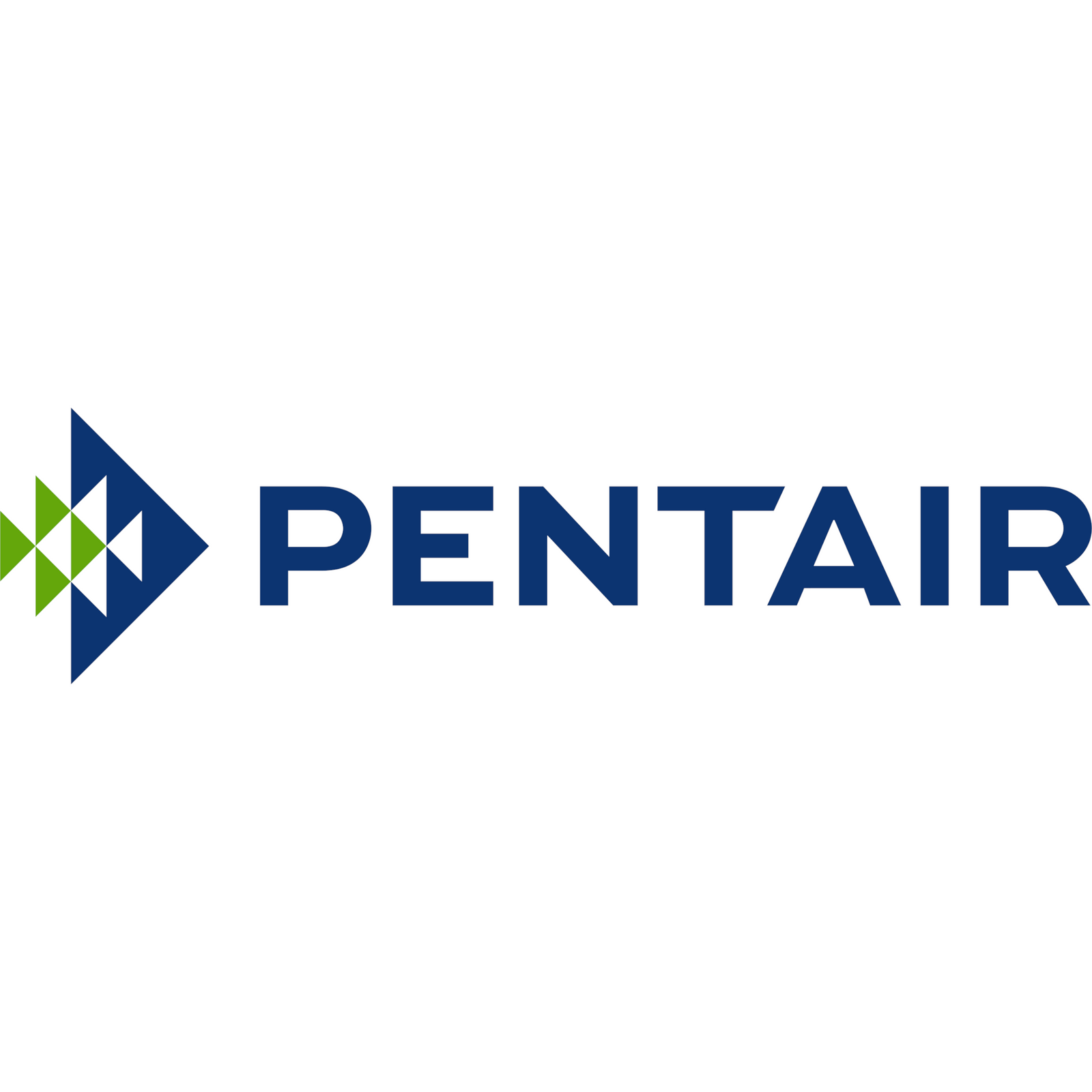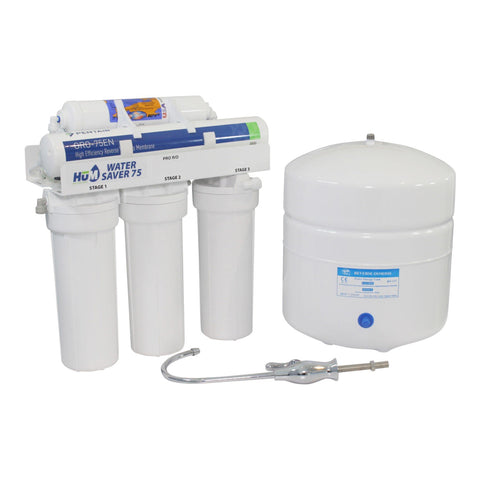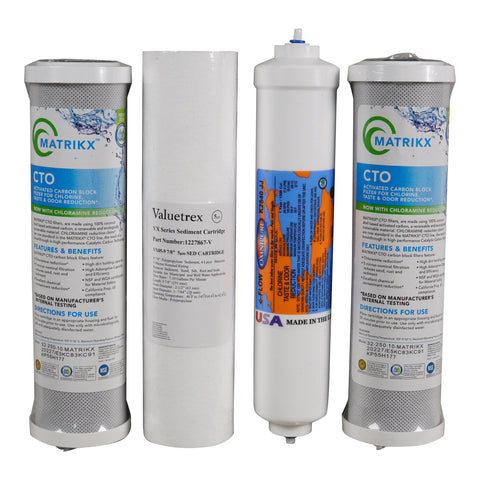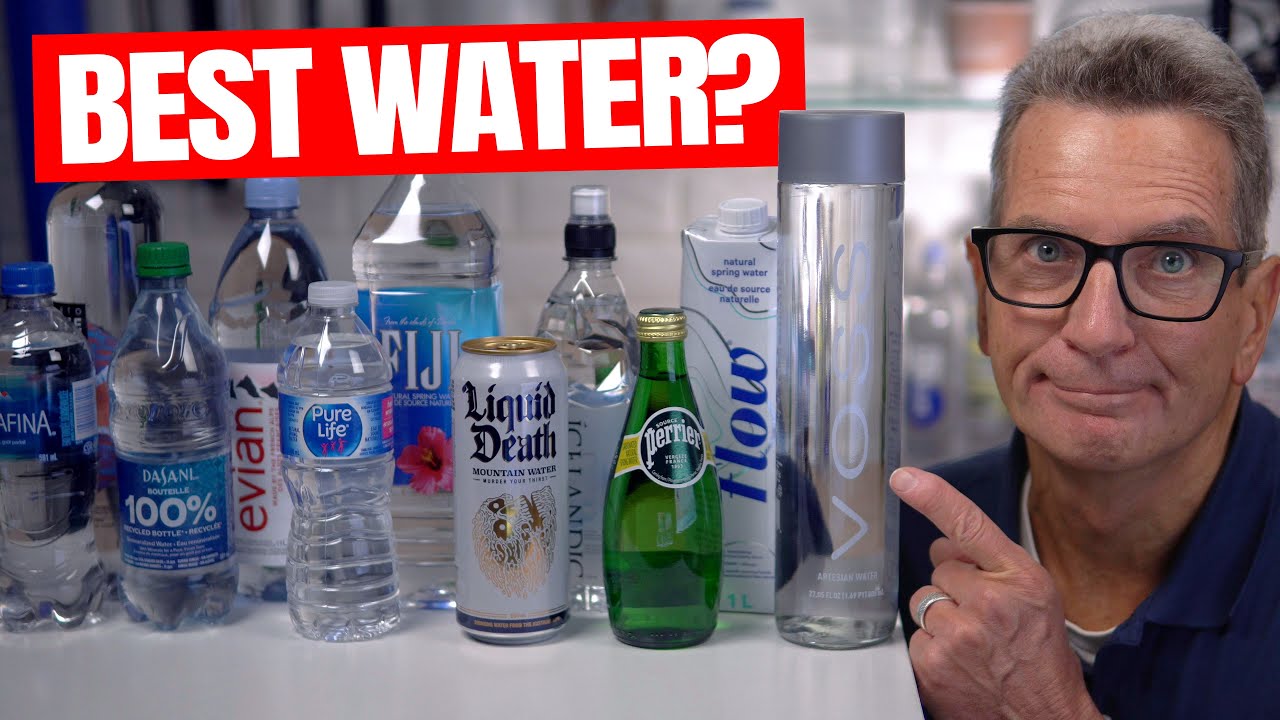
Are you one of the 43% of families who don't trust their tap water and turn to bottled water instead? With so many options out there, it can be tough to know which bottled water is the best for you and your family. That's where I come in. I'm Gary the Water Guy, and I'm here to help you navigate the confusing world of water filtration.
In this blog post, I'm going to share with you the results of my testing on 16 of the most popular bottled water brands, including those endorsed by influencers like The Rock and Nicole Kidman. Plus, I'll break down the differences between spring, distilled, reverse osmosis, alkaline, and mineral bottled waters, so you can make the best choice for your needs.
But that's not all. You'll also learn about a very scary truth about bottled water that every family needs to know. Don't miss out on this valuable information that could impact your health and well-being. Trust me, by the end of this blog post, you'll feel confident in choosing the best bottled water for your family. So let's get started!
Testing Water Quality
The quality of water can impact your health, home and even your coffee maker! To understand the quality of your water, we use several tests. Total Dissolved Solids (TDS) is our most telling method - we measure it in ppm. As water is a natural solvent, it dissolves minerals from the surface it touches. The longer it’s in contact, the more minerals it absorbs and the less pure it becomes. The lower the TDS, the purer your water is. According to the EPA, the drinking water standard for TDS is 500 ppm or less. We use a TDS meter to test bottled water.
Have you heard of pH? It’s a measure of how acidic or alkaline water is. A pH of 7 is neutral, below 7 is acidic and above is alkaline. We use a chemical test kit to measure pH.
Hardness is the measure of how much calcium and magnesium the water has absorbed in the ground. Hardness can coat your kettle or clog your coffee maker. We use a test kit to measure the hardness of each water.
You may have seen some labels, but don’t worry, we’ll decode them! Let's continue to learn more about the quality of your water and make informed choices. Unlike "The Rock" and other social media influencers, we focus on the science and facts to help you make the best decisions.
Hard Water Versus Soft Water

Get your own TDS METER right here!
Decoding Your Water Bottle Label
So you can better understand what you’re drinking, consider the info on the label. First, what type of water is it: spring, distilled, or reverse osmosis? What about electrolytes? We’ll explain each one of those a little later. But for now, what does the nutritional label tell you? Generally, the cleaner the label, the less “stuff” in that water, and the purer the water.
Here are the symbols for the elements on water labels and what they represent.
| SiO2 | Silicon | F | Fluoride |
| Cl | Chloride | SO4 | Sulphates |
| Cu | Copper | Zn | Zinc |
| Mg | Magnesium | NO3 | Nitrate |
| Na | Sodium or Salt | N | Nitrogen |
| As | Arsenic | Pb | Lead |
| HCO3 | Bicarbonate | K | Potassium |
| Ca | Calcium | SiO2 | Silica |
To get a baseline for comparison purposes we can compare them to typical municipal water, rainwater and lake water. Why rain and lake water? I don’t know about you, but I believe mankind, wildlife, birds, bees, trees and all living things for that matter, were not put on this planet with the intention of drilling 200-foot wells in the ground and inventing pumps to suck out our water. The most likely sources of drinking water for us, before they became polluted, are lakes, rivers and rain.
Baseline Water Comparison Chart
| City | River or Lake | Rain | |
| pH | 7.0 | 6.2 | 5.5 |
| TDS | 300 | 127 | 11 |
WHAT IS SPRING WATER?
Spring water comes from underground but naturally flows to the surface. To be artesian spring water, it needs to come from an artesian well. The water in the aquifer (a subsurface rock unit that holds and transmits water) must be under enough pressure to force it up the well to a level that is higher than the top of the aquifer. Artesian water has no special chemical or medicinal qualities. Spring water is typically processed by running through a carbon filter and UV light to kill any bacteria and then bottled and shipped.
Spring Water Comparison
We have 8 Spring/Artisian Bottled Water brands here:
- Nestle Pure Life
- Fiji Water
- Evian
- Voss
- Icelandic Glacial Water
- Liquid Death
- Perrier
- Flow Water
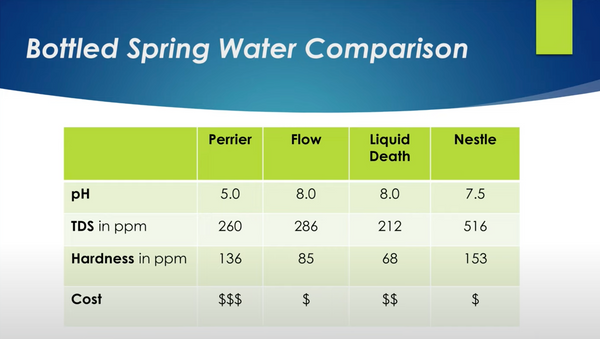
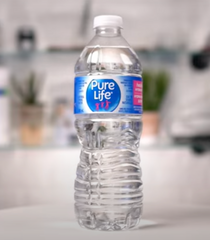
1. Nestle Pure Life
Nestle Pure Life Bottled water is owned by, you guessed it, Nestlé. Over the last few years, there has been significant controversy about where their water comes from and whether or not they have extracted so much water it has caused drought in Canadian Provinces like BC and Ontario. Nestle says it is spring water that comes from underground, natural sources. Although there does seem to be some controversy about how much of that is actually true.
On the Nestle website, it says: “The pH of Nestlé® Pure Life® water is 7.8 at Lightwood source and 6.5 at Oakwood source.” We tested the pH as 7.5 and a very high 516 ppm TDS, likely due to the water source that was used. In fact, it’s so high you could call it mineral water. This water was quite hard, which is typical for spring water as it absorbs the minerals in the ground. This water tastes very thick or dense, due to the high mineral content. But Nestlé Pure Life is by far the cheapest of the bunch.
Given the controversy, no celebrity endorses this product. I sure wouldn’t.
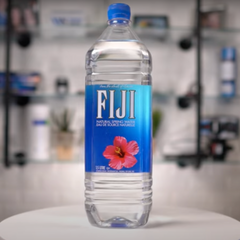
2. Fiji Water
Fiji Water is an alkaline natural artesian spring water, created when underground water has been filtered a number of times through impermeable volcanic rock. It comes straight from the source in Viti Levu (Fiji Islands… why it’s called Fiji water).
Once it has been extracted, it’s filtered to remove any particulate matter, micron-filtered to remove microbiological particles and then ultraviolet light (or UV) is used to disinfect. Fiji water is actually tested regularly for many hundreds of organic and inorganic chemicals.
We tested Fiji Water with a pH of 7.7 which does make this an alkaline water! But, it’s fairly hard at 85 ppm, so it might clog your Keurig and the TDS is 131 ppm, which for bottled water is also on the high side. The water has a great taste and is expensive.
Fiji Water has high praise from Actress Nicole Kidman who also endorses them for being a green company!
BUT, my problem with this product and pretty much all bottled water, is the amount of time water sits in a bottle between when it’s bottled at the source, shipped to a coast, loaded into a container, loaded onto a ship, delivered to North America — where it eventually ends up on grocery shelves in the same bottle in all kinds of potentially hot environments along the way. Remember, water is a natural solvent and the longer it sits in a container, the more likely it is to leach elements from the container, including glass. And there’s another huge problem with all of these European waters when shipped to North America, but we’ll get to that later.

3. Evian
Evian is a natural spring water that also contains only naturally occurring electrolytes from the French Alps! Wow… that sounds pretty darn fancy to me. It’s also rich in nitrates. They say it balances the water in the body as well as the sensory nervous system because it contains a high level of sodium chloride. It’s high in potassium, retaining the pH balance in the body and boosting the production of enzymes. This all sounds like amazing stuff to me. When you think of Evian natural spring water that comes from the French Alps, there is definitely a romantic notion that comes with that, isn't there?
We tested the pH level at 8.0, but the TDS of 283 ppm and hardness of 136 ppm was among the highest of all bottled water tested, which will definitely clog your Keurig. Their label and website states that they have 6.5 ppm of sodium in their water, which is quite a bit of salt! If you or your family are on a sodium-reduced diet this bottled water is not for you. In fact, many communities have tap water with similar specifications.
American and Pirelli Calendar model,Gigi Hadid, is a big fan of Evian Bottled water and she shares the same health philosophy as the brand. According to the Evian website, in 2022, "Evian is partnering with historic Paris Fashion house Balmain, and Balmain’s creative director Olivier Rousteing to design a limited edition 750 ml glass bottle inspired by Evian natural spring water and enhanced with Balmain’s signature embellished details and gold lettering – inviting us all to dream about our future together." No word about whether the water is any different!
I have the same concerns about this stuff being shipped with its time delay from France to North America in those bottles. It does taste okay, but quite thick — you can taste the extra minerals in the water that contribute to its hardness and relatively high TDS. And once again, this water is quite expensive.
Evian bottled water also promotes that their water has electrolytes from the French Alps.
So what are electrolytes anyway? They’re minerals that carry an electric charge. They’re found in your blood, urine and sweat and are vital to specific processes that keep your body functioning as it should. Common electrolytes are sodium, potassium, chloride, calcium, magnesium and bicarbonate.
How do you get electrolytes? From eating a balanced diet. Sodium is in most foods found in North America, so we don’t need more of that. Chlorides are found in table salt. Potassium is in fruits and vegetables like bananas, avocados and sweet potatoes. Magnesium is in seeds and nuts. Calcium is found in dairy products and orange juice. In fact, an 8-ounce glass of orange juice will give you 30% of the recommended daily amount of calcium you need! So you don’t need water “fortified” with electrolytes. In fact, you would need to drink a bathtub full of “water fortified with electrolytes” to get the same amount of calcium as that orange juice. Water only accounts for 2-3% of the Electrolytes needed for your daily diet, the rest comes from foods.
Yes, and again we’ve got the same potential problem of water sitting in the same container for a long time.
Ready to explore 25 Food Sources of Electrolytes?
Learn more about Electrolytes and Water Myths here!

4. Voss
Voss is another brand bottled at an artesian water source, this time in the “pristine wilderness of Southern Norway”. It’s naturally filtered and protected from pollutants — or so they claim. Voss also boasts an extremely low TDS (total dissolved solids), which we measured as 23 ppm, although they claim that it’s 40 ppm. The pH level of Voss is 5.0, making this one of the most acidic bottled waters we tested. Their website says that Voss bottled water is Kosher certified too, in case that’s important to you.
Dwayne “The Rock” Johnson is an actor and former wrestler who promotes the Voss water bottle brand. Johnson is more than just a promoter signed to a brand deal; he now has an ownership stake in the company which is why he promotes the brand... although I found nothing saying what he, or anyone else for that matter, likes most about this product. Since being shipped from Norway to North America, the same concern exists about storage time.
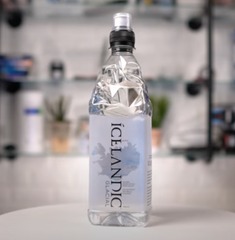
5. Icelandic Glacial Water
Icelandic Glacial Water is the world’s first Carbon Neutral certified water. it’s sustainably sourced directly from the legendary Olfus spring in Iceland with a naturally high pH of 8.4 which if you’re looking for alkaline water, makes this a great choice! We tested the pH as 8.0 and the TDS as 52 ppm. It also showed a hardness of 17 ppm.
What makes this special is that the high pH is naturally occurring. Unlike many bottled waters on the market, Icelandic is naturally alkaline, meaning the water’s pH level is from nature. In their case, it’s from being filtered through lava rock, which also increases the TDS compared to the Reverse Osmosis water. If you specifically want alkaline water, Icelandic Glacial Water is a good choice!
I have the same concern here though about the length of time between bottling the water to the end consumer as they may be under some highly questionable storage conditions.
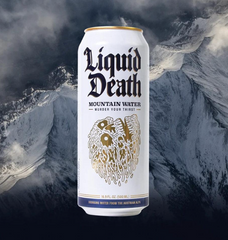
6. Liquid Death
Liquid Death... comes in a can!? So I guess it isn’t bottled water, it’s canned water! Interesting, right? And for all those wondering, yes, liquid death — putting water in a can — is just a cool marketing technique for some spring water.
Liquid Death water comes from a deep underground mountain source protected by a few hundred feet of stone. The water is tapped straight from the source into the company's air-tight cans. They also claim that it goes through a ‘fancy’ purification process that 100% maintains the original mineral profile of the water. Likely, a carbon filter and UV disinfection to make sure it is odour and bacteria-free.
We tested Liquid Death with a pH of 8.0 and TDS of 212 ppm and a hardness of 68 ppm. Making this one of the most alkaline waters tested and, once again, destined to clog your Keurig.
Liquid Death promotes itself with international rapper, Whiz Khalifa, as good bong water. He went on Instagram to share a video of him pouring the branded water into a bong before smoking. If you check out their website, a lot of their videos and content supports that kind of lifestyle. No one mentions the actual taste of the water. So as you’ve probably guessed by now it’s just a marketing ploy of spring water with a unique name in a beer can.
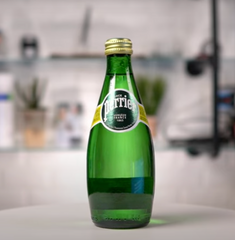
7. Perrier
Perrier Sparkling Natural Spring Water has delighted generations of beverage seekers for over 150 years, with its unique blend of distinctive bubbles and balanced mineral content. Originating in France, its effervescent spirit is known worldwide.
Although this water has a very low pH of 5.0 it also has a fairly high TDS of 260 ppm, which puts it just above the mineral water content threshold.
Again, my concerns rest about water bottled in Europe and then sitting for months on end before it gets to the consumer.
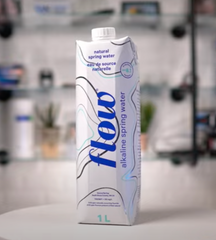
8. Flow Water
Flow water is yet another 100% naturally alkaline spring water from an artesian spring in a unique package. The pH measured in as 8.0, with a TDS of a fairly high 286 ppm, so it is mineral water which they say is rich in electrolytes. The hardness was one of the highest at 85 ppm. Their packaging is unique and they claim it’s 100% recyclable and 68-75% renewable. The cap is plant-based.
If you crave alkaline water and you believe in the merits of the packaging, this one might be a good choice for you!
WHAT IS REVERSE OSMOSIS WATER?
While spring water is pretty much used without much processing from when it comes out of the ground, Reverse Osmosis purification is where water is forced through a membrane and the good, low mineral content water goes through the membrane and is used; the high mineral content water goes to waste while flushing the membrane. The process also removes chemicals like chlorine, fluoride, chloramines, ppcp’s thm’s as well as herbicides and pesticides from water. So Reverse Osmosis water typically has a very low TDS, lower pH and is very pure.
Reverse Osmosis Water Comparison
We’ve got 5 brands of Reverse Osmosis bottled water here and they are at a medium price point:
- Aquafina
- Dasani
- Boxed Water
- Arto Life Wtr
- Smart Water
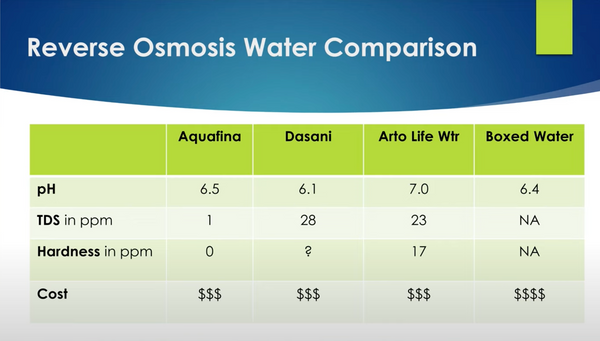
Let's take a pause! If you’ve been brainwashed by some misinformation about Reverse Osmosis or “RO” water, I encourage you to check out my Reverse Osmosis Myths and Misconceptions Video below before you continue!
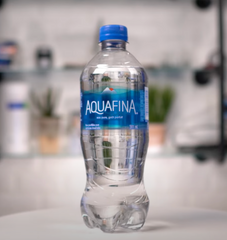
Aquafina
Aquafina, which is owned by Pepsi, is municipal water that has been purified by Reverse Osmosis, which removes impurities and contaminants. We tested Aquafina at 1 ppm TDS, with a slightly acidic pH of 6.5. And it was soft and tasted clean and fresh!
Gilleon Smith, fashion director for New York Fashion Week stated in an ad for Aquafina that she stays hydrated with Aquafina while working.
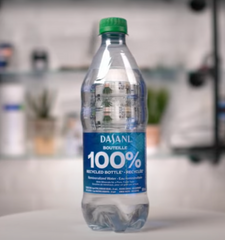
Dasani
Dasani, which is owned by Coca Cola also uses Reverse Osmosis to purify its water. But they add back in a blend of minerals, including magnesium sulfate, potassium chloride, and salt — yup, salt. They say this is what gives Dasani water its unique taste and provides health benefits. We all know adding salt to food makes it taste better but I’ve never heard of adding salt as a health benefit.
We tested Dasani at a higher 28 ppm TDS, likely due to the stuff they’ve added compared to Aquafina. It was slightly more acidic at 6.1 pH. And it was soft and tasted clean and fresh! Similar, medium price, as with Aquafina.
When travelling away from home, this is the bottled water we drink!
What about boxed water? So, in the answers to questions that nobody asked section, we have boxed water. Instead of the water being stored in plastic which is “not only bad for the earth but bad for you ”, it’s stored in a BPA-free box made of mostly paper (76%) like a milk carton.
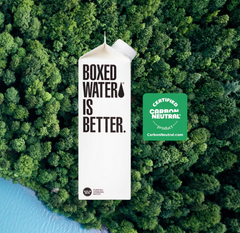
Boxed Water is purified with carbon and reverse-osmosis filtration before using UV and ozone for disinfection. Like all Reverse Osmosis water, with boxed water they don’t add fluoride — not sure why anyone would — and the process actually removes any existing fluoride from the municipal water, which is a good thing.
I couldn’t find Boxed Water anywhere here in Canada, the one distributor they had listed didn’t have any available when we stopped by to purchase. They did offer to ship it to me for $50 plus the cost of the bottled water. With a pH of 6.4 and 2 ppm of mineral content, it’s basically just another brand of reverse osmosis water in a cardboard milk carton to minimize the environmental impact of plastic water bottles, which is important! If the packaging and its impact on the environment is important to you and you can find it at a reasonable price, this is a great choice.
KeKe Palmer, an American actress, singer and TV personality, has been shouting out the brand on social media endorsing and singing its praises for being environmentally conscious! Curious, like pretty much all celebrities endorsing a bottled water brand, she doesn’t mention anything about the taste or health benefits of this water.
Arto Life Wtr

Arto Life Wtr is another water purified by the Reverse Osmosis process and has electrolytes added to neutralize the pH and add some taste. The TDS tested at 23 ppm and we have a neutral pH of 7.0 and hardness of 17 ppm. Gorgeous artwork here on the bottle at a very high price! Nothing special about the water here, folks!
What about distilled water? You very seldom hear about distilled water for drinking because the process, which involves boiling the water until it evaporates then capturing it when it condenses back into water, leaving behind the impurities, is water with 0 TDS and tastes awful.
Smart Water
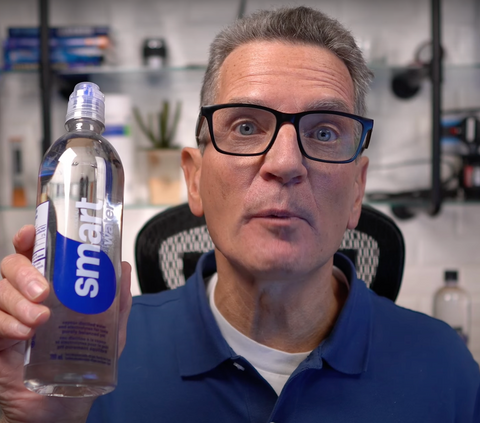
Smart Water is made from British spring water which is distilled from municipal water sources before electrolytes are added to improve the taste. Interestingly enough, Glaceau Smartwater is owned by Energy Brands, which is a subsidiary of the Coca-Cola Company… which means the same company that owns Dasani also owns this one as well.
Smartwater has a pH level of 6.5 so it’s mildly acidic, 25 ppm of TDS and a hardness of 1. They say electrolytes are added (to improve the taste) but nothing about what kind and how much of each kind.
Zendaya, a global actress, has been named Smart Water’s new global brand ambassador. She says: “I'm proud to work with a brand that encourages those in pursuit of something smarter, and shares a vision for universal access to safe and clean water.” She goes on to say, “Whether I'm on set, backstage or in between meetings, SmartWater helps me stay hydrated and keep it smart.” See what she did there! Curious that she doesn’t say anything about why she prefers this to any of the other bottles of water. But that seems to be the case with all of the bottled water influencers.
This is basically just remineralized distilled water in a very good looking and sturdy water bottle.
GARY THE WATER GUY'S OVERALL CONSENSUS
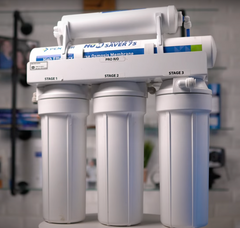
So what does MY family drink when at home or work? We drink super pure Reverse Osmosis water from our HUM Water Saver 75 Reverse Osmosis system. We don’t need to worry about how long the water has sat in a container, its specifications are very close in ph and TDS to lake, river or rain water. We have an unlimited supply on tap and it costs us pennies a glass, so it’s much cheaper than any bottled water. If you want water that is more alkaline you can always add a remineralization filter to add calcium or potassium back into your water.
... AND let’s not forget the elephant in the room regarding bottled, canned or boxed water.
What’s most often overlooked is the environmental impact (and carbon footprint) of shipping that bottled water from the source to each country, city warehouse and store — especially from Europe! I wonder what “The Rock” thinks about that?
So, we know what water “the Rock” drinks, but how about you? What brand of bottled water are you currently drinking? Which will you switch to now?


